人教版七年级下册 Unit 4 Don't eat in class. 单元复习知识点课件 (共41张PPT)
文档属性
| 名称 | 人教版七年级下册 Unit 4 Don't eat in class. 单元复习知识点课件 (共41张PPT) | 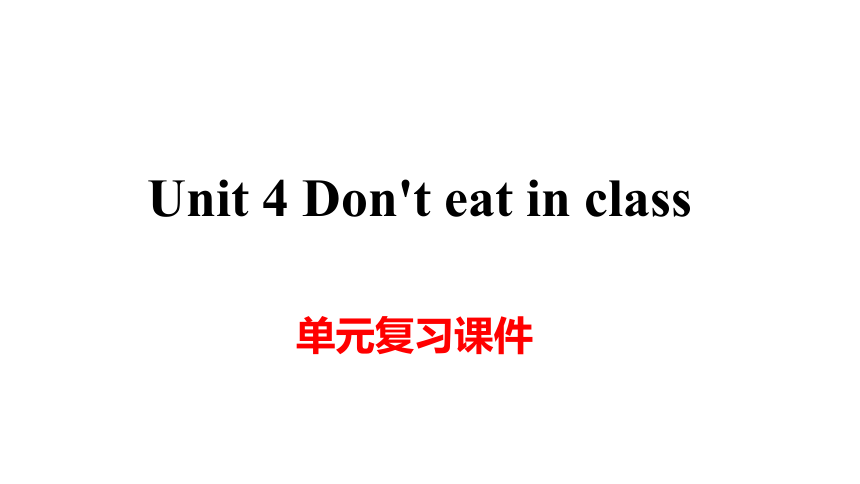 | |
| 格式 | zip | ||
| 文件大小 | 1.1MB | ||
| 资源类型 | 教案 | ||
| 版本资源 | 人教新目标(Go for it)版 | ||
| 科目 | 英语 | ||
| 更新时间 | 2023-04-10 22:08:07 | ||
图片预览

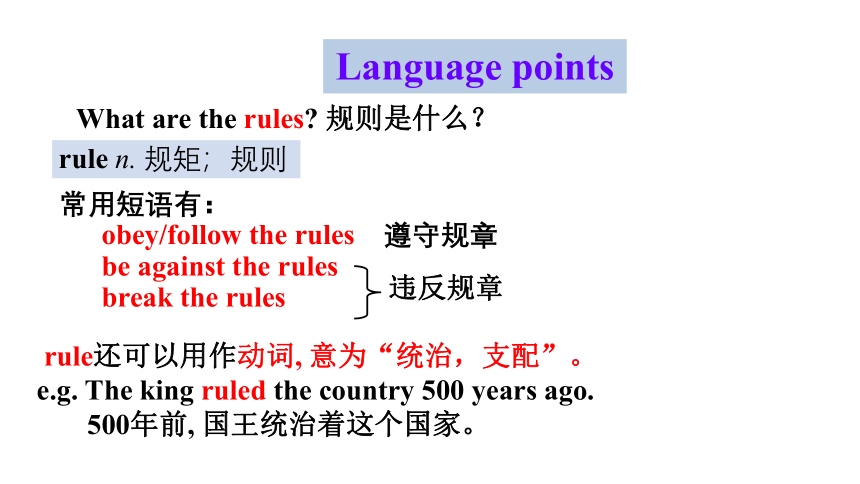
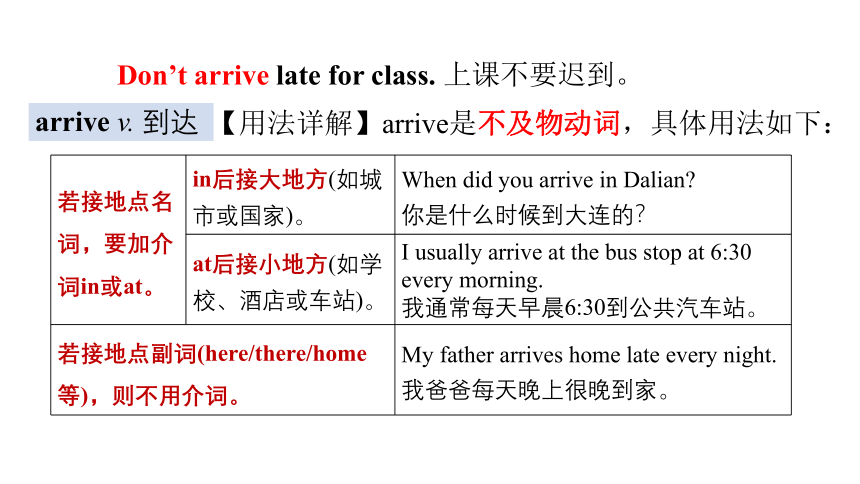

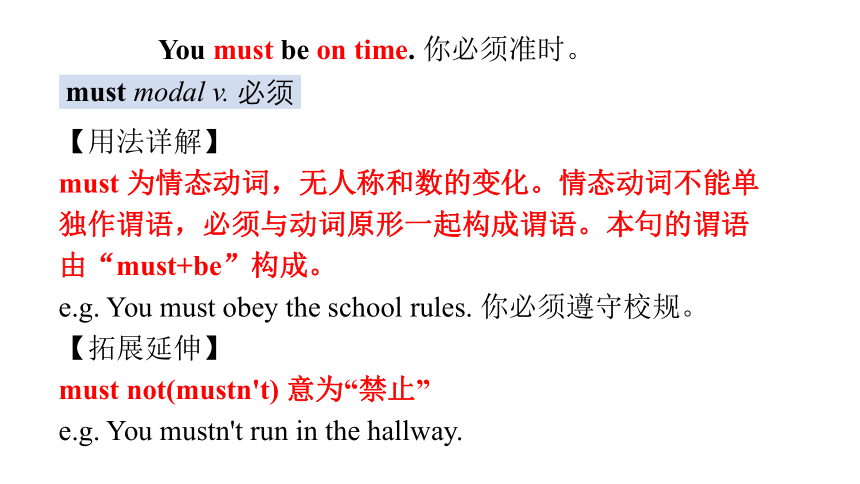
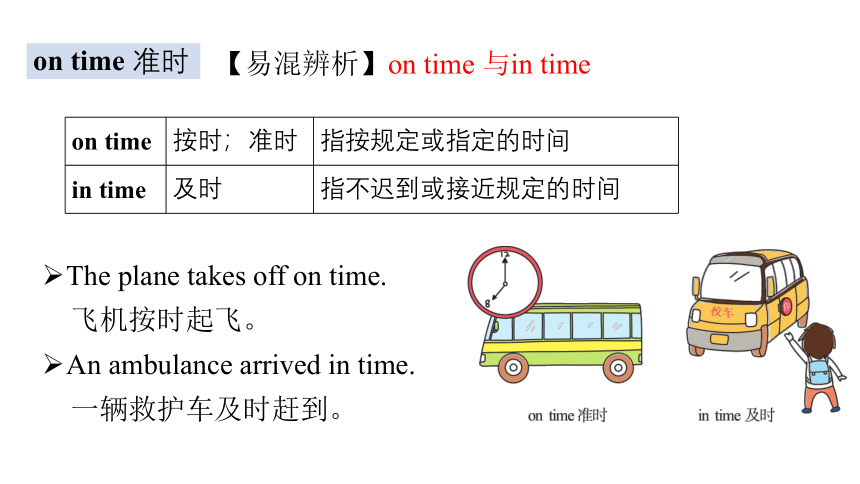
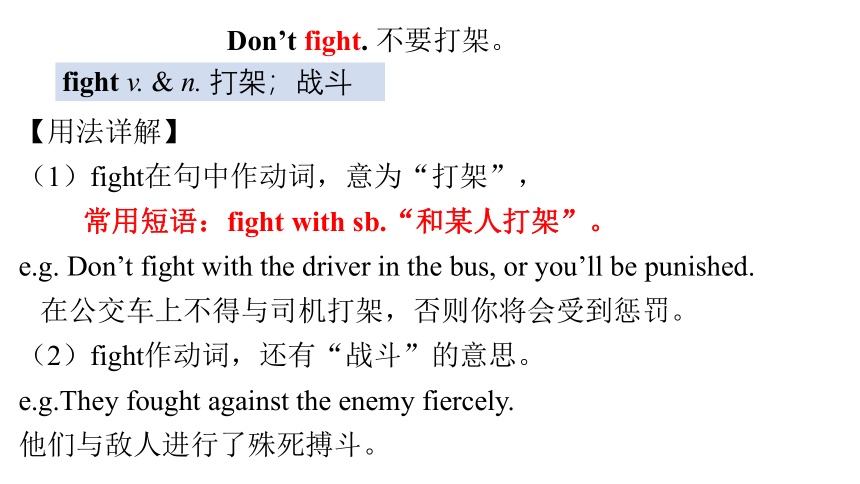
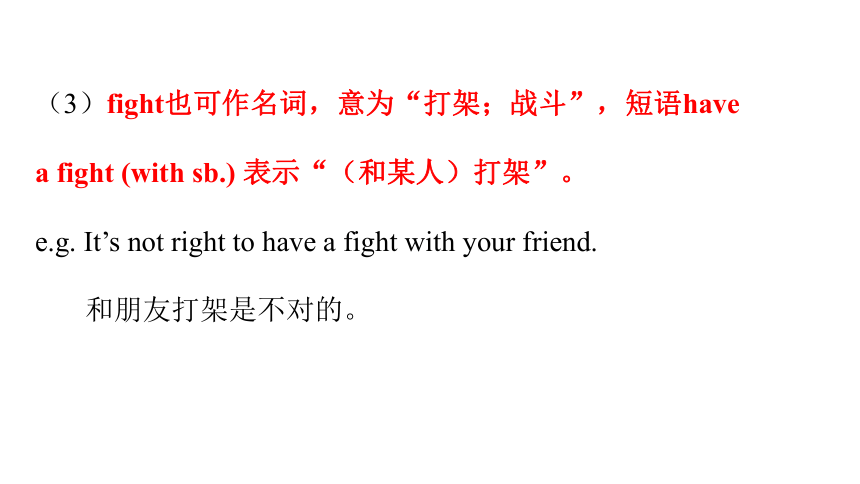
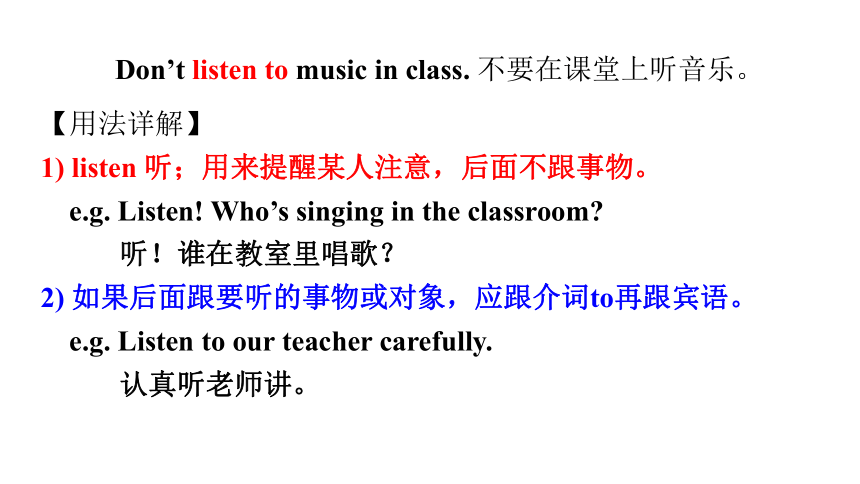
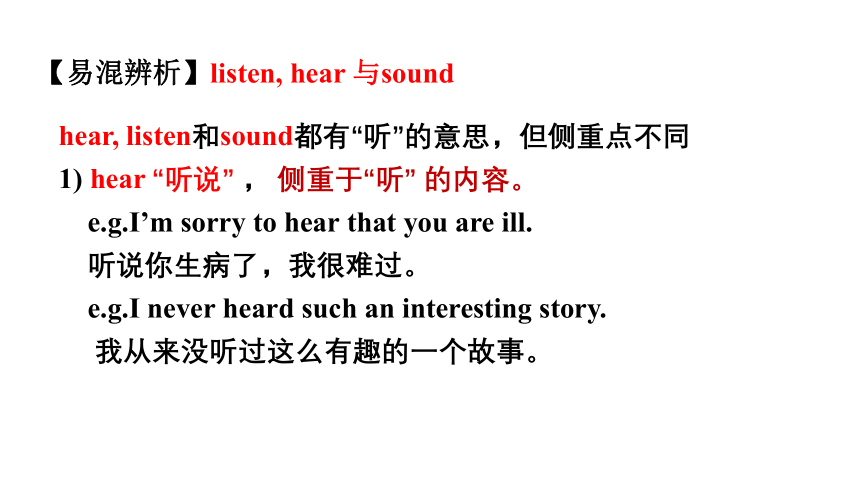
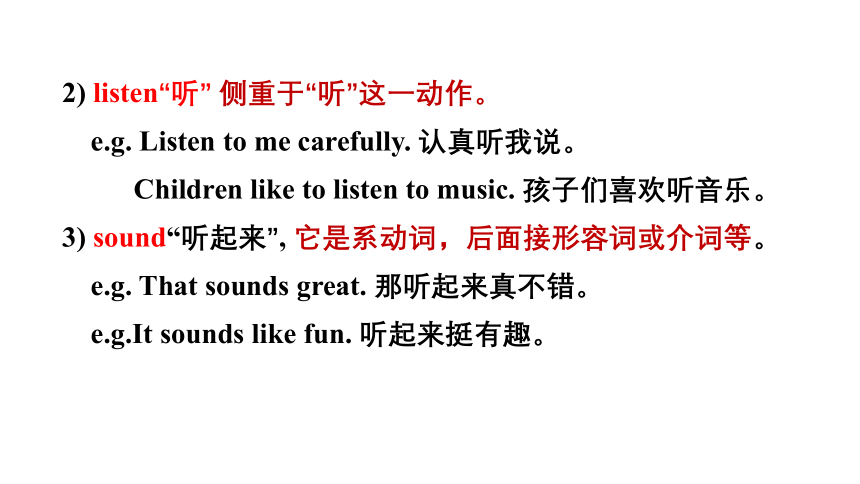
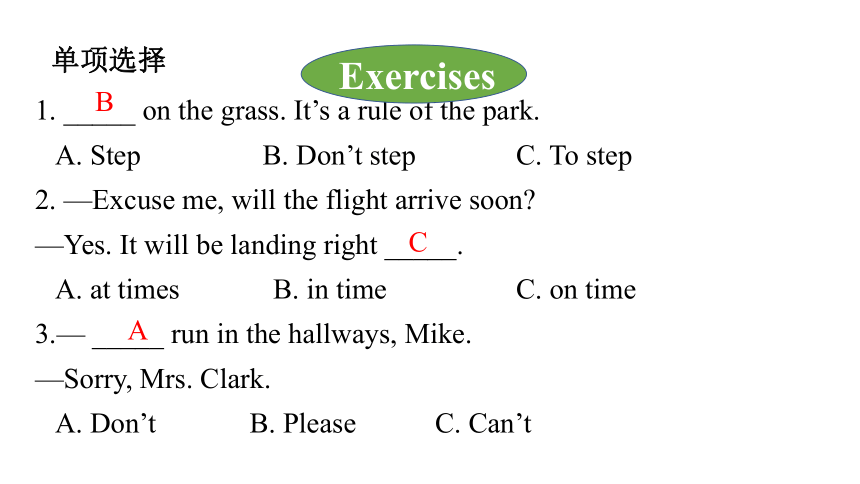
文档简介
(共41张PPT)
单元复习课件
Unit 4 Don't eat in class
Language points
What are the rules 规则是什么?
常用短语有:
obey/follow the rules 遵守规章
be against the rules
break the rules
违反规章
rule n. 规矩;规则
rule还可以用作动词, 意为“统治,支配”。
e.g. The king ruled the country 500 years ago.
500年前, 国王统治着这个国家。
arrive v. 到达
Don’t arrive late for class. 上课不要迟到。
【用法详解】arrive是不及物动词,具体用法如下:
若接地点名 词,要加介词in或at。 in后接大地方(如城市或国家)。 When did you arrive in Dalian
你是什么时候到大连的?
at后接小地方(如学校、酒店或车站)。 I usually arrive at the bus stop at 6:30 every morning.
我通常每天早晨6:30到公共汽车站。
若接地点副词(here/there/home等),则不用介词。 My father arrives home late every night. 我爸爸每天晚上很晚到家。
祈使句的否定形式
【用法详解】本句是祈使句的否定形式,结构为“Don’t +动词原形+其他”。祈使句通常省略主语you,以动词原形开头,用于向对方发出指令、请求等。
Read more books, and you will improve your reading skills.
多读书吧,这样你就会提高你的阅读技能。
Don’t answer the phone while crossing the road.
过马路时不要接电话。
must modal v. 必须
You must be on time. 你必须准时。
【用法详解】
must 为情态动词,无人称和数的变化。情态动词不能单独作谓语,必须与动词原形一起构成谓语。本句的谓语由“must+be”构成。
e.g. You must obey the school rules. 你必须遵守校规。
【拓展延伸】
must not(mustn't) 意为“禁止”
e.g. You mustn't run in the hallway.
on time 准时
【易混辨析】on time 与in time
on time 按时;准时 指按规定或指定的时间
in time 及时 指不迟到或接近规定的时间
The plane takes off on time.
飞机按时起飞。
An ambulance arrived in time.
一辆救护车及时赶到。
Don’t fight. 不要打架。
【用法详解】
(1)fight在句中作动词,意为“打架”,
常用短语:fight with sb.“和某人打架”。
e.g. Don’t fight with the driver in the bus, or you’ll be punished.
在公交车上不得与司机打架,否则你将会受到惩罚。
(2)fight作动词,还有“战斗”的意思。
e.g.They fought against the enemy fiercely.
他们与敌人进行了殊死搏斗。
fight v. & n. 打架;战斗
(3)fight也可作名词,意为“打架;战斗”,短语have a fight (with sb.) 表示“(和某人)打架”。
e.g. It’s not right to have a fight with your friend.
和朋友打架是不对的。
Don’t listen to music in class. 不要在课堂上听音乐。
【用法详解】
1) listen 听;用来提醒某人注意,后面不跟事物。
e.g. Listen! Who’s singing in the classroom
听!谁在教室里唱歌?
2) 如果后面跟要听的事物或对象,应跟介词to再跟宾语。
e.g. Listen to our teacher carefully.
认真听老师讲。
【易混辨析】listen, hear 与sound
hear, listen和sound都有“听”的意思,但侧重点不同
1) hear “听说” , 侧重于“听” 的内容。
e.g.I’m sorry to hear that you are ill.
听说你生病了,我很难过。
e.g.I never heard such an interesting story.
我从来没听过这么有趣的一个故事。
2) listen“听” 侧重于“听”这一动作。
e.g. Listen to me carefully. 认真听我说。
Children like to listen to music. 孩子们喜欢听音乐。
3) sound“听起来”, 它是系动词,后面接形容词或介词等。
e.g. That sounds great. 那听起来真不错。
e.g.It sounds like fun. 听起来挺有趣。
单项选择
1. _____ on the grass. It’s a rule of the park.
A. Step B. Don’t step C. To step
2. —Excuse me, will the flight arrive soon
—Yes. It will be landing right _____.
A. at times B. in time C. on time
3.— _____ run in the hallways, Mike.
—Sorry, Mrs. Clark.
A. Don’t B. Please C. Can’t
B
C
A
Exercises
This is very important. 这是非常重要的。
【用法详解】
important为形容词,可作表语或定语。常用句型: It is important (for sb.) to do sth. “(对某人来说)做某事是重要的”。
Doing exercise is important. 做运动很重要。
It is an important meeting. 这是一次重要的会议。
important adj. 重要的
反义词:unimportant; 名词:importance.
Can we bring music players to school 我们可以把音乐播放器带到学校吗?
【用法详解】bring为及物动词,反义词为take(带走)。常用结构有:
bring v. 带来;取来
bring
bring sb./sth. to +地点名词 把某人/某物带到某地(后跟地点副词时省略to)
bring sb. sth.=bring sth.for sb. 给某人带来某物
Bring your ID card to school. 把你的身份证带到学校来。
He brings me a big cake. = He brings a big cake for me.
他给我带来了一个大蛋糕。
【易混辨析】bring, take, carry与get
bring 带来;取来 从别处带到说话人这边,多与here连用。
take 带走;拿走 从说话人这边带到别处,多与there连用。
carry 搬运 无方向性,多指搬重物。
get 去拿来 从这边去别处,拿东西再回到这边。
Bring your raincoat here. 把你的雨衣拿到这里。
You’d better take her to hospital. 你最好带她去医院。
Can you help me carry the box 你能帮我搬这个箱子吗?
Please get me my glasses. 请把我的眼镜拿来。
Can we... 我们能……吗?
【用法详解】该句式用于询问是否许可或征求对方同意。
—Can we eat in the classroom
我们可以在教室里吃东西吗?
—No, we can’t.
不,我们不能。
【用法详解】wear作动词,强调状态。其宾语除衣服、鞋、帽子、手套外,还可以是首饰、眼镜、耳机、胡子、假发、奖章等。
You should wear a hat for the party. 这次晚会,你应该戴一顶帽子。
Don’t wear earphones while you are out. 当你在外面时不要戴耳机。
She always wears a pair of glasses. 她总是戴着一副眼镜。
And we always have to wear the school uniform. 并且我们得一直穿着校服。
wear v. 穿;戴
【拓展延伸】put on也可表示“穿;戴”,但它强调动作,指把衣服鞋、袜、帽子、手套等穿上或戴上。
It’s snowing outside. You’d better put on your scarf.
外面在下雪。你最好戴上你的围巾。
put on wear
1) have to意为“不得不”,强调“客观需要”。
They have to wear school uniforms every day.
他们每天不得不穿校服。
2) must 意为“必须”,强调主观上的愿望。
It’s late. I must go home now.
天晚了。现在我必须要回家。
【易混辨析】have to与 must
Exercises
1.________ (听) me! We don’t have much time.
2.Come on, Alice! We must get to school ________ (按时).
3.—Where’s Jane
—She’s in the __________ (餐厅).
4.It’s raining. Don’t play ________ (在外面) the room.
5.Can I ________ (带来) my music player to school
Listen to
on time
dinning hall
outside
bring
一、根据汉语提示填空
1.— Can I listen to music in class
— _____. But you can do it after class in the hallways.
A. Yes, please B. No, you can’t C. No, you don’t D. Yes, you can
2.— When do you arrive _____ school every day
— _____ eight o’clock.
A. at; At B. in; In C. in; At D. at; In
3.Please _____ my English book here. I need it.
A. take B. bring C. to take D. to bring
B
A
B
二、单项选择
practice v.& n.练习
practice the guitar 练习吉他
【用法详解】
(1) practice 在此处作动词,其后可以接名词、代词或动词-ing形式作宾语。
You need to practice English every day. 你需要每天练习英语。
These foreigners are practicing speaking Chinese. 这些外国人正在练习说汉语。
(2) practice还可作名词,意为“练习”。
Practice makes perfect. 熟能生巧。
Learning English needs practice. 学习英语需要练习。
do the dishes 清洗餐具
dish n.碟;盘
【用法详解】dish作可数名词,常用the dishes表示“(待清洗的)餐具”。dish还有“菜肴;一道菜”之意。
The glass dish is beautiful. 那个玻璃盘很漂亮。
This is an excellent hot main dish. 这是一道绝好的热主菜。
碟;盘
菜肴
before prep.& conj.在……以前;adv. 以前
3. before dinner 晚饭前
【用法详解】before 在此处为介词,意为“在……以前”,表示时间,反义词为 after(在……以后)。
You must go to bed before 10 o’clock. 你必须在10点前上床睡觉。
Exercises
一、单项选择
1. —How do you improve your spoken English
— By practicing ______ to my teachers and classmates.
A. talking B. to talk C. talk
2.I can’t watch TV ______ school nights.
A. on B. at C. in
3.We must wash our hands ______ having meals.
A. in front of B. before C. after
A
A
B
noisy adj. 吵闹的
【用法详解】noisy作形容词,其反义词为quiet(安静的)。
Turn down the TV. It’s too noisy. 把电视声音调小一些,太吵了。
【拓展延伸】noisy的名词形式为noise,意为“喧闹声;噪声”,作可数名词或不可数名词均可。
At school, we have more rules — don’t be noisy, don’t eat in
class, … 在学校,我们有更多的规定——不能喧哗,不要在课上吃东西,
more adj.& pron. 更多(的)
【用法详解】
(1) more在此处作形容词,是many的比较级,修饰可数名词复数(rules)。more还可作much的比较级,修饰不可数名词。
I have more books than her. 我的书比她的多。
You should drink more water. 你应该多喝水。
(2) more还可作代词,意为“更多”。
The cake is delicious. I want some more. 这蛋糕很好吃,我想再来一些。
After dinner, I can’t relax either. 晚饭后我也不能放松。
relax v. 放松;休息
【用法详解】relax作及物动词和不及物动词均可。relax oneself 意为“放松自己”。
Don’t be nervous. Just relax. 不要紧张,放松点。
She relaxes herself by listening to music. 她通过听音乐的方式来使自己放松。
形容词形式:relaxing adj.令人放松的 relaxed adj.感到轻松的
either adv. 也
副词either表示“也”,用于否定句句末,用法与表示肯定或陈述的副词too相似,可用逗号与语句的主题隔开。
e.g. You like English. I like it, too.
你喜欢英语,我也喜欢。
My father can’t speak English. My mother can’t (speak it), either.
我爸不会讲英语,我妈也不会。
I must read a book before I can watch TV. 在看电视之前我
必须先读一本书。
read v. 读;阅读
【用法详解】read在句中作及物动词,其过去式还是read,但读作/red/。
My father often reads newspapers in the morning. 我爸爸经常在早上读报。
【拓展延伸】read也可作不及物动词,意为“阅读;朗读”。
You read and I write. 你读我写。
【易混辨析】read, look, see与watch
read 强调看书、报纸、杂志等有文字的东西。
look 强调“看”的动作,不强调“看见”这个结果,是不及物动词,后接宾语时要与介词at连用。
see 强调“看”的结果,表示“看见;看到”。see也用于一些短语中,如:see a doctor“看医生”,see a movie“看电影”。
watch 强调“观看”正在运动或变化的事物,有时含有“欣赏”之意。
I know how you feel. 我知道你的感受。
feel v. 感受;觉得
【用法详解】feel作系动词,在此意为“感受;觉得”,其后可接形容词、副词或介词短语。
I feel sorry for him. 我为他感到可惜。
I am feeling in a good mood. 我现在心情好。
【拓展延伸】feel作系动词,意为“摸起来”,后可接形容词作表语。
The silk feels very soft. 这丝绸摸起来很柔软。
I don’t feel well. I may have a fever. 我感到不舒服,我可能发烧了。
Parents and schools are sometimes strict, but remember, they
make rules to help us. 父母和学校有时是严格的,但是记住,他们制订规则是为了帮助我们。
【用法详解】strict是形容词,在句中作定语或表语。常见搭配:
strict adj. 严格的;严厉的
be strict with sb. 对某人要求严格
be strict in sth. 对某事要求严格
strict
remember v. 记住;记起
【易混辨析】remember to do sth. 与 remember doing sth.
remember to do sth. 意为“记着做某事”,此事目前未做。 Remember to turn off the lights when you leave the classroom. 离开教室时记得关灯。
remember doing sth. 意为“记得已经做过某事”,此事目前已做。 I remember seeing the movie in the cinema. 我记得我在电影院看过这部电影了。
单项选择
1.—Do your parents let you watch TV on school nights
—No. They are ______ with me.
A. kind B. strict C. difficult D. busy
2.For our safety, we must ______ the traffic rules on the way to school.
A. follow B. change C. make D. break
3.The bed ______soft and comfortable. It sells well.
A. sounds B. tastes C. feels D. smells
B
A
C
Exercises
4.—I’m not sure where to buy the ticket.
—Sorry, I’ve no idea_____.
A. either B. too C. also D. so
5.My daughter helps me cook, but she isn’t old enough to be left alone in the______.
A. bedroom B. classroom C. lab D. kitchen
6.I often have no time to play with my friends because I have______ homework to do every day.
A. too many B. too much C. many too D. much too
A
D
B
7.—What does your father do after dinner
—He usually ______ newspapers.
reads B. watches C. looks D. sees
8.—All of us will take the entrance exam for the senior high school in June.
—______!
Of course B. Good luck
C. Congratulations D. You’re welcome
A
B
9.Remember ______some fruit when you come back.
buying B. to buy C. buy D.to buying
10.—Daniel, do you know that bees never get lost
—Yes. Bees always remember ______ the same way as they went.
A.come back B. came back
C. coming back D. to come back
B
D
单元复习课件
Unit 4 Don't eat in class
Language points
What are the rules 规则是什么?
常用短语有:
obey/follow the rules 遵守规章
be against the rules
break the rules
违反规章
rule n. 规矩;规则
rule还可以用作动词, 意为“统治,支配”。
e.g. The king ruled the country 500 years ago.
500年前, 国王统治着这个国家。
arrive v. 到达
Don’t arrive late for class. 上课不要迟到。
【用法详解】arrive是不及物动词,具体用法如下:
若接地点名 词,要加介词in或at。 in后接大地方(如城市或国家)。 When did you arrive in Dalian
你是什么时候到大连的?
at后接小地方(如学校、酒店或车站)。 I usually arrive at the bus stop at 6:30 every morning.
我通常每天早晨6:30到公共汽车站。
若接地点副词(here/there/home等),则不用介词。 My father arrives home late every night. 我爸爸每天晚上很晚到家。
祈使句的否定形式
【用法详解】本句是祈使句的否定形式,结构为“Don’t +动词原形+其他”。祈使句通常省略主语you,以动词原形开头,用于向对方发出指令、请求等。
Read more books, and you will improve your reading skills.
多读书吧,这样你就会提高你的阅读技能。
Don’t answer the phone while crossing the road.
过马路时不要接电话。
must modal v. 必须
You must be on time. 你必须准时。
【用法详解】
must 为情态动词,无人称和数的变化。情态动词不能单独作谓语,必须与动词原形一起构成谓语。本句的谓语由“must+be”构成。
e.g. You must obey the school rules. 你必须遵守校规。
【拓展延伸】
must not(mustn't) 意为“禁止”
e.g. You mustn't run in the hallway.
on time 准时
【易混辨析】on time 与in time
on time 按时;准时 指按规定或指定的时间
in time 及时 指不迟到或接近规定的时间
The plane takes off on time.
飞机按时起飞。
An ambulance arrived in time.
一辆救护车及时赶到。
Don’t fight. 不要打架。
【用法详解】
(1)fight在句中作动词,意为“打架”,
常用短语:fight with sb.“和某人打架”。
e.g. Don’t fight with the driver in the bus, or you’ll be punished.
在公交车上不得与司机打架,否则你将会受到惩罚。
(2)fight作动词,还有“战斗”的意思。
e.g.They fought against the enemy fiercely.
他们与敌人进行了殊死搏斗。
fight v. & n. 打架;战斗
(3)fight也可作名词,意为“打架;战斗”,短语have a fight (with sb.) 表示“(和某人)打架”。
e.g. It’s not right to have a fight with your friend.
和朋友打架是不对的。
Don’t listen to music in class. 不要在课堂上听音乐。
【用法详解】
1) listen 听;用来提醒某人注意,后面不跟事物。
e.g. Listen! Who’s singing in the classroom
听!谁在教室里唱歌?
2) 如果后面跟要听的事物或对象,应跟介词to再跟宾语。
e.g. Listen to our teacher carefully.
认真听老师讲。
【易混辨析】listen, hear 与sound
hear, listen和sound都有“听”的意思,但侧重点不同
1) hear “听说” , 侧重于“听” 的内容。
e.g.I’m sorry to hear that you are ill.
听说你生病了,我很难过。
e.g.I never heard such an interesting story.
我从来没听过这么有趣的一个故事。
2) listen“听” 侧重于“听”这一动作。
e.g. Listen to me carefully. 认真听我说。
Children like to listen to music. 孩子们喜欢听音乐。
3) sound“听起来”, 它是系动词,后面接形容词或介词等。
e.g. That sounds great. 那听起来真不错。
e.g.It sounds like fun. 听起来挺有趣。
单项选择
1. _____ on the grass. It’s a rule of the park.
A. Step B. Don’t step C. To step
2. —Excuse me, will the flight arrive soon
—Yes. It will be landing right _____.
A. at times B. in time C. on time
3.— _____ run in the hallways, Mike.
—Sorry, Mrs. Clark.
A. Don’t B. Please C. Can’t
B
C
A
Exercises
This is very important. 这是非常重要的。
【用法详解】
important为形容词,可作表语或定语。常用句型: It is important (for sb.) to do sth. “(对某人来说)做某事是重要的”。
Doing exercise is important. 做运动很重要。
It is an important meeting. 这是一次重要的会议。
important adj. 重要的
反义词:unimportant; 名词:importance.
Can we bring music players to school 我们可以把音乐播放器带到学校吗?
【用法详解】bring为及物动词,反义词为take(带走)。常用结构有:
bring v. 带来;取来
bring
bring sb./sth. to +地点名词 把某人/某物带到某地(后跟地点副词时省略to)
bring sb. sth.=bring sth.for sb. 给某人带来某物
Bring your ID card to school. 把你的身份证带到学校来。
He brings me a big cake. = He brings a big cake for me.
他给我带来了一个大蛋糕。
【易混辨析】bring, take, carry与get
bring 带来;取来 从别处带到说话人这边,多与here连用。
take 带走;拿走 从说话人这边带到别处,多与there连用。
carry 搬运 无方向性,多指搬重物。
get 去拿来 从这边去别处,拿东西再回到这边。
Bring your raincoat here. 把你的雨衣拿到这里。
You’d better take her to hospital. 你最好带她去医院。
Can you help me carry the box 你能帮我搬这个箱子吗?
Please get me my glasses. 请把我的眼镜拿来。
Can we... 我们能……吗?
【用法详解】该句式用于询问是否许可或征求对方同意。
—Can we eat in the classroom
我们可以在教室里吃东西吗?
—No, we can’t.
不,我们不能。
【用法详解】wear作动词,强调状态。其宾语除衣服、鞋、帽子、手套外,还可以是首饰、眼镜、耳机、胡子、假发、奖章等。
You should wear a hat for the party. 这次晚会,你应该戴一顶帽子。
Don’t wear earphones while you are out. 当你在外面时不要戴耳机。
She always wears a pair of glasses. 她总是戴着一副眼镜。
And we always have to wear the school uniform. 并且我们得一直穿着校服。
wear v. 穿;戴
【拓展延伸】put on也可表示“穿;戴”,但它强调动作,指把衣服鞋、袜、帽子、手套等穿上或戴上。
It’s snowing outside. You’d better put on your scarf.
外面在下雪。你最好戴上你的围巾。
put on wear
1) have to意为“不得不”,强调“客观需要”。
They have to wear school uniforms every day.
他们每天不得不穿校服。
2) must 意为“必须”,强调主观上的愿望。
It’s late. I must go home now.
天晚了。现在我必须要回家。
【易混辨析】have to与 must
Exercises
1.________ (听) me! We don’t have much time.
2.Come on, Alice! We must get to school ________ (按时).
3.—Where’s Jane
—She’s in the __________ (餐厅).
4.It’s raining. Don’t play ________ (在外面) the room.
5.Can I ________ (带来) my music player to school
Listen to
on time
dinning hall
outside
bring
一、根据汉语提示填空
1.— Can I listen to music in class
— _____. But you can do it after class in the hallways.
A. Yes, please B. No, you can’t C. No, you don’t D. Yes, you can
2.— When do you arrive _____ school every day
— _____ eight o’clock.
A. at; At B. in; In C. in; At D. at; In
3.Please _____ my English book here. I need it.
A. take B. bring C. to take D. to bring
B
A
B
二、单项选择
practice v.& n.练习
practice the guitar 练习吉他
【用法详解】
(1) practice 在此处作动词,其后可以接名词、代词或动词-ing形式作宾语。
You need to practice English every day. 你需要每天练习英语。
These foreigners are practicing speaking Chinese. 这些外国人正在练习说汉语。
(2) practice还可作名词,意为“练习”。
Practice makes perfect. 熟能生巧。
Learning English needs practice. 学习英语需要练习。
do the dishes 清洗餐具
dish n.碟;盘
【用法详解】dish作可数名词,常用the dishes表示“(待清洗的)餐具”。dish还有“菜肴;一道菜”之意。
The glass dish is beautiful. 那个玻璃盘很漂亮。
This is an excellent hot main dish. 这是一道绝好的热主菜。
碟;盘
菜肴
before prep.& conj.在……以前;adv. 以前
3. before dinner 晚饭前
【用法详解】before 在此处为介词,意为“在……以前”,表示时间,反义词为 after(在……以后)。
You must go to bed before 10 o’clock. 你必须在10点前上床睡觉。
Exercises
一、单项选择
1. —How do you improve your spoken English
— By practicing ______ to my teachers and classmates.
A. talking B. to talk C. talk
2.I can’t watch TV ______ school nights.
A. on B. at C. in
3.We must wash our hands ______ having meals.
A. in front of B. before C. after
A
A
B
noisy adj. 吵闹的
【用法详解】noisy作形容词,其反义词为quiet(安静的)。
Turn down the TV. It’s too noisy. 把电视声音调小一些,太吵了。
【拓展延伸】noisy的名词形式为noise,意为“喧闹声;噪声”,作可数名词或不可数名词均可。
At school, we have more rules — don’t be noisy, don’t eat in
class, … 在学校,我们有更多的规定——不能喧哗,不要在课上吃东西,
more adj.& pron. 更多(的)
【用法详解】
(1) more在此处作形容词,是many的比较级,修饰可数名词复数(rules)。more还可作much的比较级,修饰不可数名词。
I have more books than her. 我的书比她的多。
You should drink more water. 你应该多喝水。
(2) more还可作代词,意为“更多”。
The cake is delicious. I want some more. 这蛋糕很好吃,我想再来一些。
After dinner, I can’t relax either. 晚饭后我也不能放松。
relax v. 放松;休息
【用法详解】relax作及物动词和不及物动词均可。relax oneself 意为“放松自己”。
Don’t be nervous. Just relax. 不要紧张,放松点。
She relaxes herself by listening to music. 她通过听音乐的方式来使自己放松。
形容词形式:relaxing adj.令人放松的 relaxed adj.感到轻松的
either adv. 也
副词either表示“也”,用于否定句句末,用法与表示肯定或陈述的副词too相似,可用逗号与语句的主题隔开。
e.g. You like English. I like it, too.
你喜欢英语,我也喜欢。
My father can’t speak English. My mother can’t (speak it), either.
我爸不会讲英语,我妈也不会。
I must read a book before I can watch TV. 在看电视之前我
必须先读一本书。
read v. 读;阅读
【用法详解】read在句中作及物动词,其过去式还是read,但读作/red/。
My father often reads newspapers in the morning. 我爸爸经常在早上读报。
【拓展延伸】read也可作不及物动词,意为“阅读;朗读”。
You read and I write. 你读我写。
【易混辨析】read, look, see与watch
read 强调看书、报纸、杂志等有文字的东西。
look 强调“看”的动作,不强调“看见”这个结果,是不及物动词,后接宾语时要与介词at连用。
see 强调“看”的结果,表示“看见;看到”。see也用于一些短语中,如:see a doctor“看医生”,see a movie“看电影”。
watch 强调“观看”正在运动或变化的事物,有时含有“欣赏”之意。
I know how you feel. 我知道你的感受。
feel v. 感受;觉得
【用法详解】feel作系动词,在此意为“感受;觉得”,其后可接形容词、副词或介词短语。
I feel sorry for him. 我为他感到可惜。
I am feeling in a good mood. 我现在心情好。
【拓展延伸】feel作系动词,意为“摸起来”,后可接形容词作表语。
The silk feels very soft. 这丝绸摸起来很柔软。
I don’t feel well. I may have a fever. 我感到不舒服,我可能发烧了。
Parents and schools are sometimes strict, but remember, they
make rules to help us. 父母和学校有时是严格的,但是记住,他们制订规则是为了帮助我们。
【用法详解】strict是形容词,在句中作定语或表语。常见搭配:
strict adj. 严格的;严厉的
be strict with sb. 对某人要求严格
be strict in sth. 对某事要求严格
strict
remember v. 记住;记起
【易混辨析】remember to do sth. 与 remember doing sth.
remember to do sth. 意为“记着做某事”,此事目前未做。 Remember to turn off the lights when you leave the classroom. 离开教室时记得关灯。
remember doing sth. 意为“记得已经做过某事”,此事目前已做。 I remember seeing the movie in the cinema. 我记得我在电影院看过这部电影了。
单项选择
1.—Do your parents let you watch TV on school nights
—No. They are ______ with me.
A. kind B. strict C. difficult D. busy
2.For our safety, we must ______ the traffic rules on the way to school.
A. follow B. change C. make D. break
3.The bed ______soft and comfortable. It sells well.
A. sounds B. tastes C. feels D. smells
B
A
C
Exercises
4.—I’m not sure where to buy the ticket.
—Sorry, I’ve no idea_____.
A. either B. too C. also D. so
5.My daughter helps me cook, but she isn’t old enough to be left alone in the______.
A. bedroom B. classroom C. lab D. kitchen
6.I often have no time to play with my friends because I have______ homework to do every day.
A. too many B. too much C. many too D. much too
A
D
B
7.—What does your father do after dinner
—He usually ______ newspapers.
reads B. watches C. looks D. sees
8.—All of us will take the entrance exam for the senior high school in June.
—______!
Of course B. Good luck
C. Congratulations D. You’re welcome
A
B
9.Remember ______some fruit when you come back.
buying B. to buy C. buy D.to buying
10.—Daniel, do you know that bees never get lost
—Yes. Bees always remember ______ the same way as they went.
A.come back B. came back
C. coming back D. to come back
B
D
同课章节目录
- Unit 1 Can you play the guitar?
- Section A
- Section B
- Unit 2 What time do you go to school?
- Section A
- Section B
- Unit 3 How do you get to school?
- Section A
- Section B
- Unit 4 Don't eat in class.
- Section A
- Section B
- Unit 5 Why do you like pandas?
- Section A
- Section B
- Unit 6 I'm watching TV.
- Section A
- Section B
- Review of Units 1-6
- Unit 7 It's raining!
- Section A
- Section B
- Unit 8 Is there a post office near here?
- Section A
- Section B
- Unit 9 What does he look like?
- Section A
- Section B
- Unit 10 I'd like some noodles.
- Section A
- Section B
- Unit 11 How was your school trip?
- Section A
- Section B
- Unit 12 What did you do last weekend?
- Section A
- Section B
